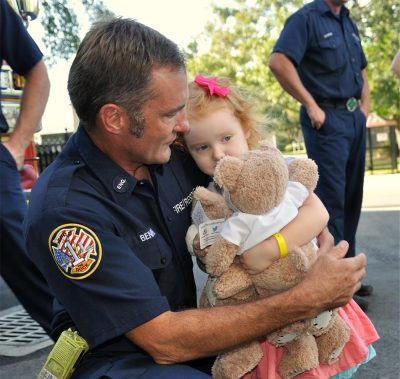Get the help you need right now 855-900-8437 Get Help Now
Get the help you need right now 855-900-8437 Get Help Now
June 6, 2018
Fire fighters and paramedics struggling with post-traumatic stress disorder (PTSD) know all too well how debilitating and exhausting this condition can be. Memories of your traumatic event can appear at inopportune moments and consume you with fear. You may find yourself suddenly overwhelmed by sadness, or go from feeling relaxed to on edge out of nowhere. Danger may seem as if it’s lurking around every corner.
You may think these symptoms are yours and yours alone. That if you just give yourself enough time, the memory of that difficult call from a few months ago will go away. You may even believe that one day you’ll wake up, and PTSD will be in your past. But the truth is, PTSD doesn’t just affect the people who struggle with it, and it rarely goes away without professional care. The effects can extend to the people close to you, including your children.
Because children are sensitive to the ways that their parents act in their presence, they can quickly pick up on many of the subtle signs of PTSD, including re-experiencing, avoidance, numbness and hyperarousal.

Without an explanation, the symptoms of PTSD can be incredibly confusing for youngsters. Children have a particularly tough time coping with these unexplained bouts of avoidance, anger or frustration. According to the U.S. Department of Veterans Affairs, most deal with these events in one of three ways:
If children don’t understand the cause of your PTSD symptoms, they may blame your behavior on themselves. Because of this, the best thing you can do for your daughter or son is tell them what’s going on, without burdening them with any graphic details. The important thing is for them to know that it’s not their fault.
But before you can explain yourself to your loved ones, you first may need to have to accept the changes in your mood, thoughts or behavior that have impacted you and your family’s daily life. This is the first step to getting back to the parent or spouse you want to be. Your friends, your family and most importantly — your children — need you.
The IAFF Center of Excellence is a behavioral health facility designed by IAFF members, for IAFF members. We’ve helped countless fire fighters and paramedics find relief from PTSD symptoms, and we can help you, too. Call a representative today for more information, or to take the first step toward a better life for yourself and the people who love you.
Medical Disclaimer: The IAFF Center of Excellence aims to improve the quality of life for people struggling with a substance use or mental health disorder with fact-based content about the nature of behavioral health conditions, treatment options and their related outcomes. We publish material that is researched, cited, edited and reviewed by licensed medical professionals. The information we provide is not intended to be a substitute for professional medical advice, diagnosis or treatment. It should not be used in place of the advice of your physician or other qualified healthcare provider.